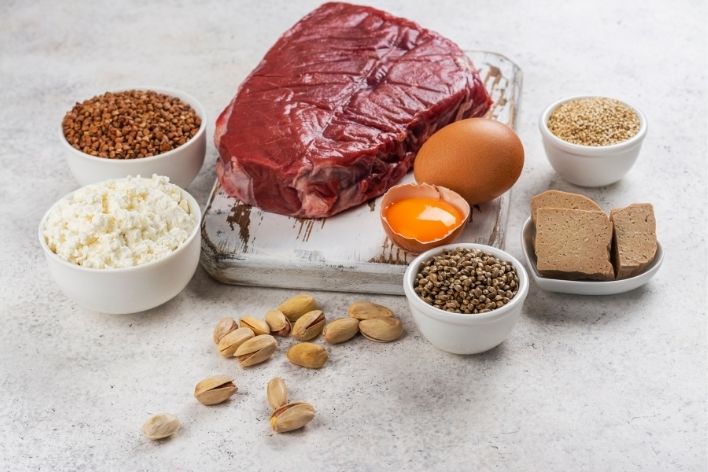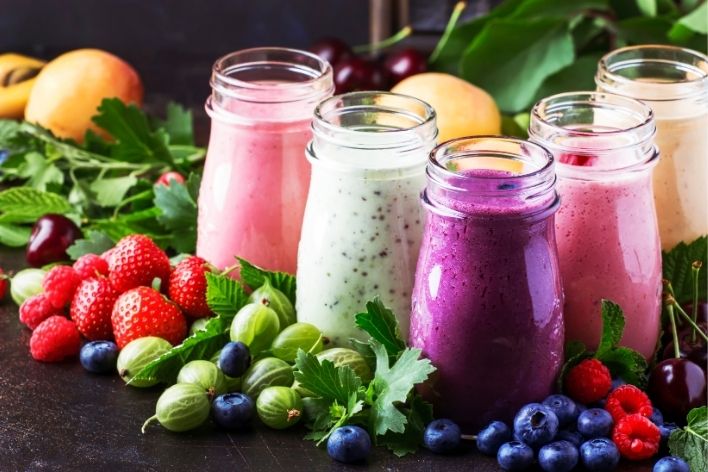Role of Protein in Child Growth

Hey kids! Have you ever wondered why your parents keep telling you to eat your protein? Perhaps you've heard them say, "You need protein to grow up strong and healthy." But what is protein exactly, and how does it help you grow? In this blog, we're going to explore that fantastic world of protein-rich foods and just why they are so essential for your growth and development!
What Is Protein?
First things first-understand what protein is. Protein is one of the three primary nutrients required to grow in the body; the other two are carbohydrates and fats. Consider protein as your ' bricks'. Bricks are used to build a house, while proteins are used to build and repair tissues, manufacture enzymes, and support your immune system.
When you eat protein, your body breaks it down into smaller parts called amino acids. These amino acids help your body do lots of awesome things, such as building muscles and making hormones that will keep you healthy, even helping you think clearly!
Why Do Children Need Protein?
You are constantly growing and changing when you are a little kid. For that, a lot of energy and nutrients with high protein content are needed in your body. So, that is why proteins are so important for growth:
Muscle Building: Protein builds and heals the muscles. The more you run, the more you play sports, and even how much more you hang around with your friends; muscles are important for all of it.
Bone Health: Protein also helps in the development of bone structure. It enhances your strength and ensures that your bones grow appropriately, which is quite important for children and teenagers.
Immune System: A healthy immune system prevents a person from getting colds and infections. Protein in your diet helps in developing antibodies that fight an illness in your body.
Energy Boost: Protein is a slow release of energy. You are not going to find yourself needing that energy drink after you eat protein. Instead, protein will keep you full and give you energy for longer periods. It's like a car. Not only does the car move on its own if it's backed in, but now, with the complete use of protein for energy, you'll have gas to go as long as you want.
Brain Function: A healthy brain requires nutrients, and without them, it starts to deteriorate. Your brain requires protein because it helps make neurotransmitters, which improve memory and moods and mainly strengthen brain functions.

Some protein-rich foods
Now that we see how important protein is to our diet, let's look at the foods which are high in protein. Consume high-protein foods if you want to grow strong and healthy. Think about these:
Meat: Chicken, turkey, beef, and pork are, among others, mostly excellent sources of proteins. They are often considered some of the highest protein-rich foods available.
Fish and Seafood: Salmon and tuna are not only high in proteins but also an abundance of very healthy fats. Shrimps and crab are two seafoods with fantastic taste, aren't they-proteinaceous too!
Milk, Yogurt, and Cheese: Milk, curd, and cheese, are considered to be a high source of proteins. Greek yogurt is a standout protein powerhouse that can be quite versatile.
Eggs: Try to have the highest amount of protein-rich foods through boiling, scrambling, or omelets.
Legumes: Beans, lentils, and chickpeas are other good plant sources of protein. They contain a lot of fibers as well, which ease digestion.
Nuts and Seeds: Almonds, peanuts, sunflower seeds, and chia seeds provide good amounts of protein. They blend well in salads or can be consumed over a plate.
Whole Grain: Quinoa, oats and whole wheat bread provide proteins besides a rich abundance of other nutrients. Quinoa is also very special because it is a complete protein.
Soy Products: Tofu and tempeh are very good plant-based protein sources because they can be used in almost anything.
The Highest Protein-rich foods
Whereas every protein food is good, some have more protein compared to others. Here are some of the highest protein-rich foods you can include in your diet.
Chicken Breast: Typically, chicken breast is a favorite because it has a lean nature. A 3-ounce serving can yield about 26 grams of protein!
Fish: Tuna has around 22 grams of protein in every 3 ounces, which ranks it as one of the fish with the highest amounts of protein.
Greek Yogurt: A cup of Greek yogurt contains 20 grams of protein and is delicious on top of that!
Eggs: A large egg will contain about 6 grams of protein. Nutritious addition to many foods.
Lentils: Cooked, 1 cup, approximately 18 grams of protein. So, they are a sure thing for vegetarians.

How Much Protein Do Kids Need?
You might be wondering how much protein you need. The amount of protein you need is dependent upon your age, gender, and level of activity. Here's a general guide for kids' protein needs:
-
1-3 years: 13 grams per day
-
4-8 years: 19 grams per day
-
9-13 years: 34 grams per day
-
14-18 years: 46-52 grams per day (higher in boys than in girls)
These will fluctuate based on your activity; sometimes your body just feels like it wants to eat, and sometimes it does not. So you should listen to your body and only eat when hungry.
How to Get Protein in Your Diet
Now that we understand why protein is a giant and what foods are high in protein, let's move on to how to incorporate them into meals. Here are some fun and easy ways:
Breakfast: Make sure to kick-start your day with a breakfast that is filled with proteins! Try scrambled eggs with toast, Greek yogurt with fruit, or oatmeal topped with nuts.
Lunch: Make your lunch more protein-filled by having chicken or turkey filling in your sandwiches. Alternatively, prepare a bean salad or chickpea salad.
Snacks: Choose protein-rich snacks like cheese sticks, boiled eggs, or nut butter on whole-grain crackers. They are delicious and will keep you going till dinner time.
Dinner: Grill fish or chicken, and serve with quinoa and vegetables. Stir-fried tofu with your favorite vegetables makes a healthy meal.
Smoothies: Mixing yogurt, spinach, and your favorite fruits makes for a smoothie. It can be a great way to add some protein and nutrients!

Interesting Facts About Protein
Here are a few cool facts about protein you may not know:
Protein Myths: Some people think that only meat is rich in protein, whereas a lot of plant-based foods contain high amounts of protein too. For example, broccoli and spinach, the two vegetables most of you have been fed since childhood, contain more protein than you expect them to.
Protein and Growth: Your body needs protein not only for your muscles but also to grow hair, nails, and skin. That is why having enough protein is super important during your growing years.
Protein Sources Around the World: Various cultures have different protein-rich foods. For instance, people in Japan eat tofu and fish, while in Mexico, beans and chicken are staples.
When to Seek Help
Usually, a parent or doctor should be consulted if you are sure you are not getting enough protein or if you have special diets. They can create a healthy diet that will work for you.
Conclusion
Your growth, development, and general health are strictly dependent on proteins. Incorporating a diversity of protein-rich foods in your diet supports your body during growth and change. Meat, fish, dairy products, beans, and nuts-the number of choices and good-tasting foods in never-ending.
So the next time you sit down at a meal or snack, think of the power of protein. It will keep you as best as you can be. Keep on eating those proteinaceous foods and growing up strongly and healthily! Happy eating!
MCQs
1. Why is protein important for children’s growth?
A) It helps in the production of energy only
B) It helps build and repair tissues, including muscles and organs
C) It is only important for bone development
D) It helps in regulating body temperature
Correct Answer: B) It helps build and repair tissues, including muscles and organs
2. Which of the following is a good source of protein for children?
A) Fruits
B) Vegetables
C) Lean meats and legumes
D) Sugary snacks
Correct Answer: C) Lean meats and legumes
3. How much protein do children aged 4 to 8 years need daily?
A) 5 grams
B) 10 grams
C) 13 grams
D) 19 grams
Correct Answer: D) 19 grams
4. What can happen if a child does not get enough protein?
A) Increased growth rate
B) Stunted growth and weakened immunity
C) Enhanced cognitive function
D) Excessive weight gain
Correct Answer: B) Stunted growth and weakened immunity
Discover more exciting ways to make learning fun—explore our site for engaging resources and activities today!
Related Blogs
6 Immunity Booster Tips for Kids
Is Your Child’s Diet Plan Vegetarian?
The Do's and Dont's of Raising Healthy Kids!
Other Related Section
NCERT Solutions | Sample Papers | CBSE SYLLABUS| Calculators | Converters | Stories For Kids | Poems for kids| Learning Concepts I Practice Worksheets I Formulas | Blogs
Admissions Open for
CBSE Schools In Popular Cities
- CBSE Schools in Bangalore
- CBSE Schools in Mumbai
- CBSE Schools in Pune
- CBSE Schools in Hyderabad
- CBSE Schools in Chennai
- CBSE Schools in Gurgaon
- CBSE Schools in Kolkata
- CBSE Schools in Indore
- CBSE Schools in Sonipat
- CBSE Schools in Delhi
- CBSE Schools in Rohtak
- CBSE Schools in Bhopal
- CBSE Schools in Aurangabad
- CBSE Schools in Jabalpur
- CBSE Schools in Jaipur
- CBSE Schools in Jodhpur
- CBSE Schools in Nagpur
- CBSE Schools in Ahmednagar
- CBSE School In Tumkur











